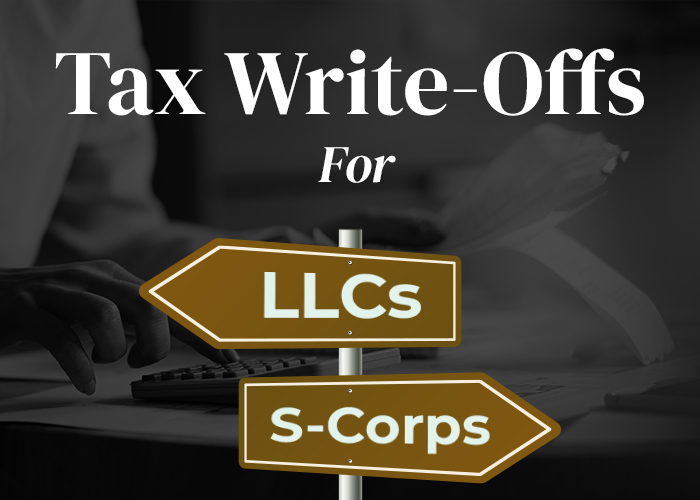9 Lesser Known Tax Write-Offs for LLCs and S-Corps

As the owner of an LLC or S-Corp, paying less money in taxes means you have more to spend on building your business to new highs. The more deductions your small business can take at tax time, the lower your tax bill will be.
While you may be aware of a few more common tax deductions your LLC or S-Corp can take this tax season, we’re sharing a list of lesser-known small business deductions you can use on your tax return to lower your taxable profit for the year.
- Self-Employment Tax
- First-Year Start-up Costs
- Training and Education Costs
- Professional Services Fees
- Pass-through Entity Deduction
- Independent Contractor Deduction
- Charitable Contributions and Gifts
- Association and Membership Dues
- Retirement Contributions
Self-Employment Tax
The first tax deduction you should take advantage of this tax season is the self-employment deduction tax. Every year, you can claim 50% of what you pay in self-employment tax as a federal income tax deduction. These are Social Security and Medicare taxes you pay as a self-employed citizen.
Deducting the employer-equivalent portion of this tax is done with your adjusted gross income and only affects your overall income tax.
To read more about eligibility requirements, check out this helpful IRS website.
First-Year Startup Costs
The first year in business is one of the toughest. Luckily, there are tax advantages for your start-up LLC or S-Corp you should know.
Start-up costs, as defined by the IRS, are expenses your LLC or S-Corp paid or incurred for creating your business or researching the creation or acquisition of your business. To be eligible for this deduction, your LLC or S-Corp must meet both of these requirements:
- You can deduct the expense if you paid or incurred the cost to operate an existing business if it is in the same field as the business entered into.
- The expense is something you paid for or incurred before your business began.
To see a list of eligible start-up costs, visit this page.
Training and Education Costs

Building a successful small business requires constant learning and growth. Your LLC and S-Corp may save money this tax season by deducting the cost of business-related training and education.
Eligible training and education expenses must:
- Maintain or improve job-related skills
- Be required by law to keep your current salary, status, or job.
Note that the training you take cannot be part of a program that educates or trains you for a new business. All training, certifications, and education programs must enhance your current trade or business.
Visit the IRS guide on the topic for more information on filing requirements.
Professional Services Fees
Running a business often means hiring and engaging with professional service providers to help keep daily operations running smoothly.
Your LLC or S-Corp can deduct fees paid to accountants, lawyers, consultants, and other service professionals. However, the expenses must be directly related to your current business and not for work to acquire business assets.
Additionally, you can deduct the cost of hiring tax professionals like Cook CPA Group to prepare for and file your LLC and S-Corp business taxes. Save money on your small business taxes this year by contacting us today.
Pass-Through Entity Deduction
Pass-through entities, like your LLC or S-Corp, are uniquely qualified for up to a 20% deduction on net business income from federal income taxes. There are some limitations, including:
- Your taxable income
- The type of trade or business
- The amount of W-2 wages paid
- Unadjusted basis immediately after acquisition of any qualified property held by the business
If you are interested in reading more about what taxable income includes, please see this IRS article for a detailed breakdown.
Independent Contractor Deduction

With the upswing in workers taking to freelancing or independent contractor work, it’s only natural that your LLC or S-Corp hire a nonemployee to perform services for your business. If your business hired an independent contractor, the expense is deductible from your year-end taxes.
For more information on deducting independent contractor expenses, read our recent blog post, How to Account for Independent Contractors in Your Business Taxes.
Charitable Contributions and Gifts
Your LLC or S-Corp can deduct qualified charitable contributions if they are in the form of cash contributions. Otherwise, this deduction is more advantageous for an individual come tax time.
That being said, any expenses your LLC or S-Corp incurs for business gifts can and should be deducted. Exceptions to this deduction include:
- Business gifts of more than $25 for every direct or indirect gift
- Gifts expenses that include any incidental costs (like packaging and mailing)
- Gifts with a permanent imprint of the company’s name
- Gifts meant for wide distribution, such as pens, bags, and cases
For more information on exceptions, read IRS Publication 535.
Association and Membership Dues
Many small businesses are not aware that the IRS allows tax deductions for membership or association dues that are required or directly related to your business.
For example, if you join your local Chamber of Commerce or pay dues for a similar business-related association, your LLC or S-Corp can claim the fee as a deduction.
These expenses can be claimed on your Schedule C form. Reach out to us today to ensure you never pay more than you have to.
Retirement Contributions

Saving for future financial needs is more important than ever. Make sure your LLC or S-Corp takes advantage of the retirement contributions deduction.
The IRS outlines a special rule you should use to calculate retirement contributions for yourself as a self-employed individual. Essentially, your retirement plan contribution is calculated based on compensation. To calculate this plan compensation, you should:
- Deduct a portion of your self-employment tax, and
- The amount of your retirement plan contribution
Once you have that number, you’ll calculate your own contribution and deduction.
Head over to the IRS’s guide on Calculation Your Own Retirement-Plan Contribution and Deduction, for a detailed overview of how to calculate your retirement contribution deduction
If you are interested in paying fewer taxes this tax season for your LLC or S-Corp, book a call with us today. Our team of expert accountants has decades of experience filing taxes and saving money for LLCs and S-Corps, and we’d be happy to help you take advantage of these lesser-known deductions!

